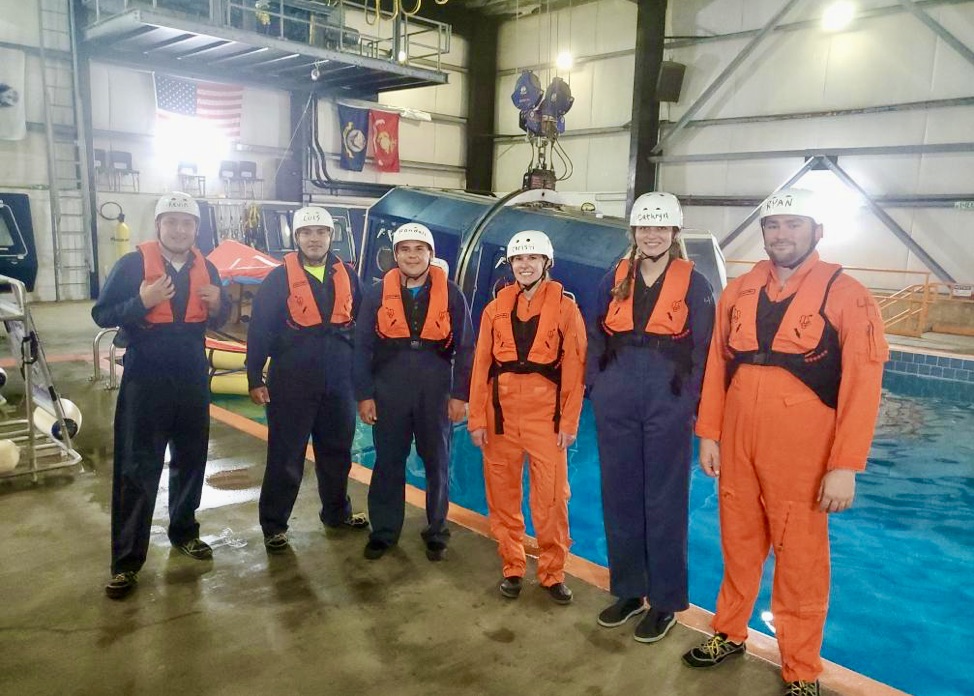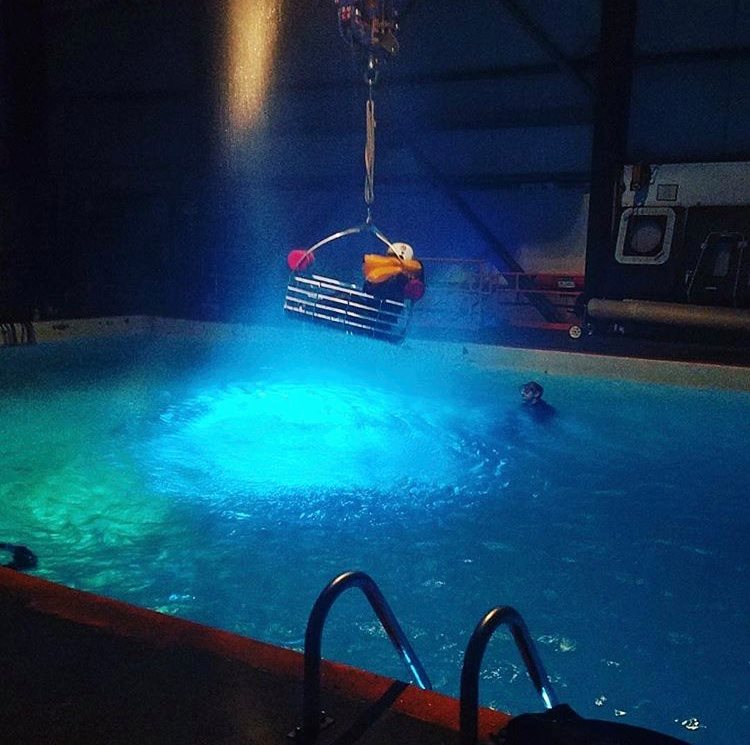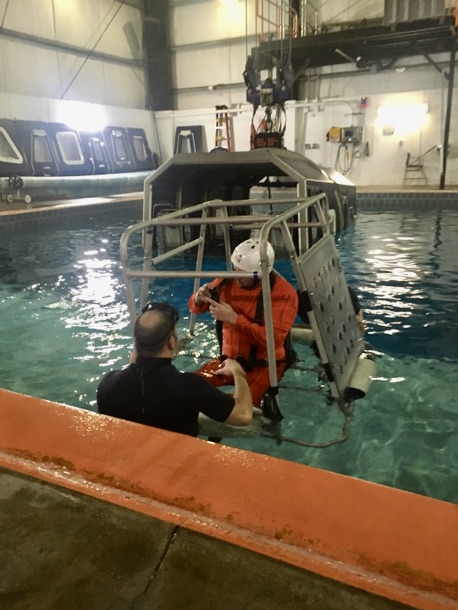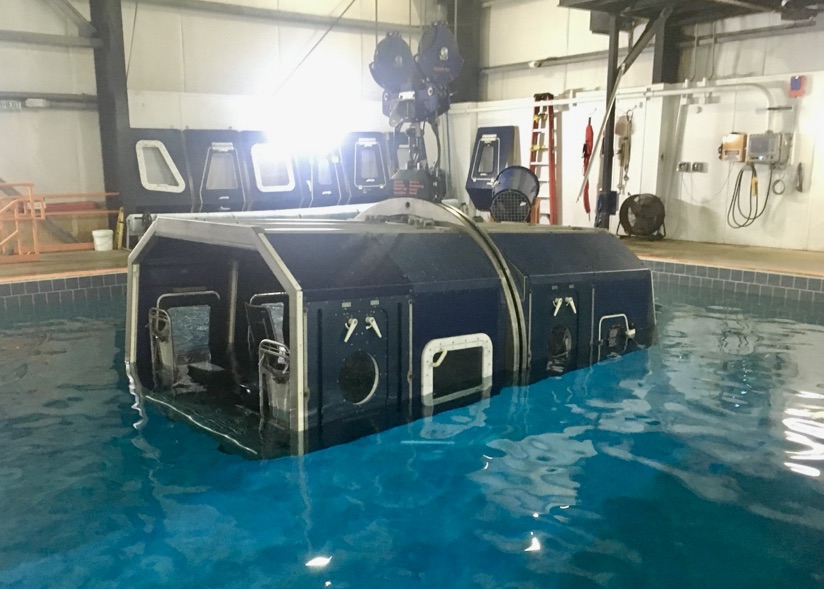

Contributors: Christi Bubac(left) & Cathryn Wood(right), New Members of CMARI’s Aerial Survey Team
Hoisted in the air, dropped into the pool, submerged underwater, and rolled. Lights out and sounds of a real crash occurring… “ditching, ditching, ditching” echoed throughout. You feel the water rushing up and filling your sinuses, which is by no means the most enjoyable thing, but with so much else to focus on, reference points, exit, seatbelt, safety, the last thing you think about is how much air remains in your lungs.
‘Ditching’ is a word that didn’t mean much to us as we began the Aviation Survival and Egress Training course offered in a small town in coastal Connecticut. However, we soon discovered that ‘ditching’ is a term used to indicate an event in which an airplane crash-lands into water. As aerial observers for the Clearwater Marine Aquarium Research Institute (CMARI) right whale research team, it is understandable why we are required to have the skill set to successfully egress (or evacuate) from the plane if it were to go down while in the field.

Crash-Simulation Training
“It’s not if your aircraft will crash, it’s when…”
Our supervisor gave us words of encouragement that the training “is not that bad” and that we would “feel like rock stars afterward.” Christi’s brother, a helicopter pilot who went through similar training and in true older sibling fashion, declared, “Oh, it’s pretty bad.”
“It’s not if your aircraft will crash, it’s when,” echoed in the room, and our heads, following the very first video our instructor showed us the morning of egress training. That terrifying line was spoken by a marine who had survived a helicopter crash that resulted in several fatalities. Along with that infamous quote that instilled the fear of God in me, the video introduced the theme of the course that I will never forget: know your reference points.

We completed a mock-helicopter rescue, with a crane-deployed rescue basket and life-like helicopter sounds, wind, thunder, and waves…
After we all passed the classroom exam, we geared up in our flight suits, helmets, and life vests and got into the water. We worked on practical exercises: pull-ups into a life raft, ocean survival tactics, heat conservation using trash bags, and ways to stay together as a group by interlocking legs. Joining us were several safety divers and instructors who ensured us that if at any point we needed assistance, they were there to help. We completed a mock-helicopter rescue, with a crane-deployed rescue basket and life-like helicopter sounds, wind, thunder, and waves – it felt like we were in a Hollywood stunt scene!
Seconds later, you find yourself inverted underwater…

The SWET chair is a chair with a seatbelt, enclosed by a frame with plexiglass exits, and is a training tool before the plane simulator. One instructor stands in front of you in the chair and another behind you, and then you hear those words: “ditching, ditching, ditching.” Seconds later, you find yourself inverted underwater and must: a) remember your reference points, b) locate and release the exit, c) remove your seatbelt, and d) swim (in the direction of least resistance, ideally) to safety. The instructors were phenomenal, supportive, and talked to each one of us through the process.

The last challenge of the day was the plane crash simulation, complete with thunder, rain, darkness, and waves. In the aircraft, we were seated with seatbelts fastened, submerged, and turned upside down. We were to act as though our closest windows were jammed, requiring us to cross the aisle to the opposite window to escape. Using our knowledge of the plane layout and each of the reference points learned earlier in the day– we did it! After five successful rounds in the simulator, we shared high fives, and befittingly said to one another, “It’s for the whales!”
Final Thoughts
Christi Bubac: I have been involved with wildlife research over the last ten years or so, from working with gray seals to gray wolves, and this egress training was amongst some of the best training that I have ever received. It’s a serious topic, and I feel this training has equipped me with the skills and confidence to make it through a ditching event. I highly recommend the course and stand with my supervisor …it’s not that bad.
Cathryn Wood: I am so grateful to the wonderful classmates and instructors who made us feel safe and encouraged throughout the day. Looking back now, I understand why the first video was shown to us, and, most importantly, I feel confident that I could survive in a similar situation during one of our surveys.
Watch a clip of the course and training we did:
Follow along as CMARI’s right whale team fly through another calving season.
All research and photos conducted under NOAA permit number 20556-01 unless otherwise stated.